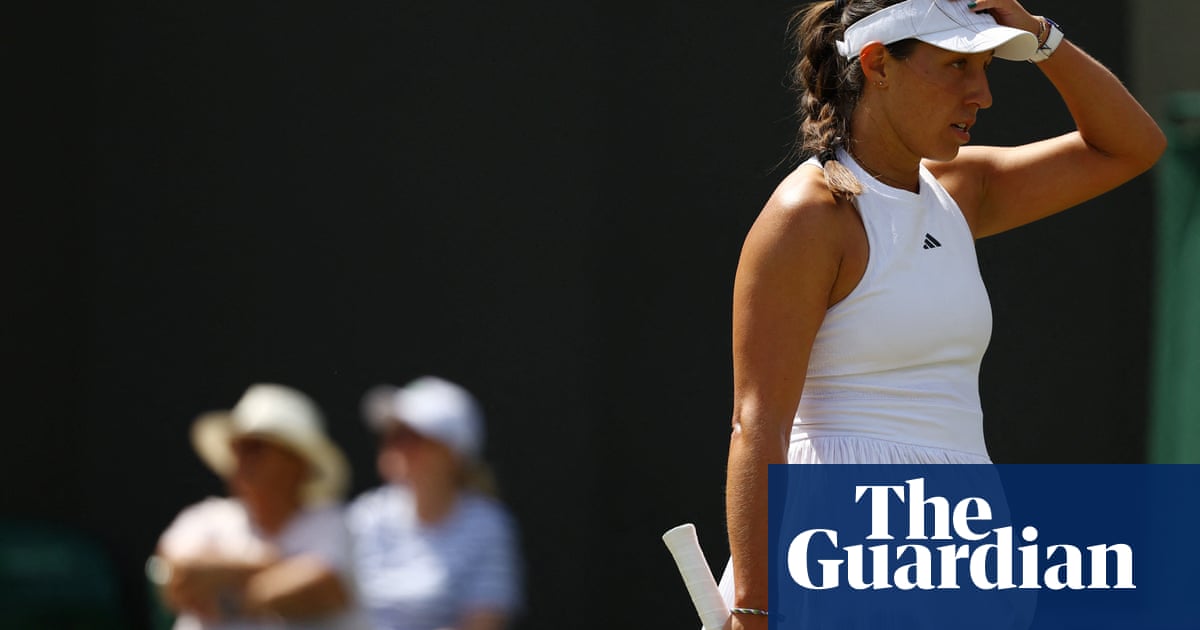
The second quarter of the women’s singles draw lost another significant name as Jessica Pegula, the world No 5 and a quarter-finalist here 12 months ago, slipped to a three-set defeat by Wang Xinyu, a grand slam winner in doubles on clay but a player who had not previously progressed beyond the second round in the singles in SW19.
Wang will now face Harriet Dart in the third round on Saturday, and while she is, on paper at least, a less formidable opponent for the Briton than the world No 5, the strength of Wang’s forehand in particular should not be underestimated.
Pegula started the match as a favourite to celebrate Independence Day with a win, but it was clear from an early stage that the American had not brought her A-game to No 3 Court. Or even her C-game, for that matter, and as Wang’s crisp forehands found the lines and her own error-count started to rise, Pegula’s body language told the story of an increasingly anxious No 5 seed.
Wang carved out the first of no fewer than six breaks of the Pegula serve in game seven. The American saved the first two of three break points from love-40, but she could not cope with the pinpoint return on to the baseline on the third.
Wang then served for the set three games later, and while the Chinese player lost a nervous opening point, Pegula missed an excellent chance to apply some serious pressure, stabbing a tentative forehand into the net, and her opponent eventually served it out to 30.
In an odd opening to the second set both players took games in pairs, with four breaks of serve in all to 4-4, and while Pegula scrapped ferociously in the ninth, saving five break points, she was broken again in the 11th to leave her opponent serving for the match. Now it was Wang’s nerve that started to wobble and a double fault at 15-40 was a miserable way to let it slip.
It turned out to be an outstanding tie-break, swinging one way and then the other amid some thunderous shot-making on both sides of the net. A match point on the Wang serve came and went and Pegula dug deep to level at 1-1.
Having stood on the brink of a well-earned success, it could have been a turning point for Wang, but she simply returned to the heavy hitting of the first set and swiftly raced to 4-0. The nerves returned slightly as she served for the match for a second time, but from 15-40, Wang fought back to deuce and after saving a third break point, a thumping serve on her third match point set up a winning volley that was gratefully put away to complete a 6-4, 6-7 (7), 6-1 success.
In the same quarter, Ons Jabeur, the beaten finalist in 2022 and 2023, eased through to the third round with a 6-1, 7-5 defeat of Robin Montgomery, while Elena Rybakina, the champion in 2022 and seeded to meet Iga Swiatek, the No 1 seed, in the semis, dropped the second set against Laura Siegemund but eventually came through 6-3, 3-6, 6-3.
Jabeur has been struggling with a recurrent right knee injury for much of the past five years and said after her victory that she has now come to terms with playing through the pain.
“I’ve just accepted that I will always have knee pain,” Jabeur said. “Maybe you see me running good on the court, but sometimes it’s tougher than other days.
“It’s definitely part of me right now. I think a big part of it mentally is accepting that I’ll always have knee pain.
“The scheduling and the amount of tournaments they are adding right now doesn’t really help. I’m really curious how players are going to play the Olympics and the hard court season. It’s going to be really tough.”
Swiatek, meanwhile, reached the third round – in which she suffered a surprise elimination two years ago – with a routine defeat of Petra Martic on Centre Court, 6-4, 6-3.
Source: theguardian.com


















